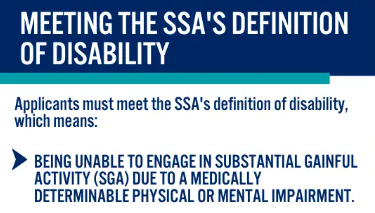If you rely on Social Security Disability (SSD) to cover your expenses, the possibility of losing those benefits can be stressful. Knowing the main reasons the Social Security Administration (SSA) may terminate your benefits can help you take steps to protect them. Below are the five most common causes of revocation:
Substantial Gainful Activity (SGA)
 To qualify for SSD, you must be unable to engage in substantial gainful activity due to your disability. If your earnings exceed the SSA’s monthly threshold, your benefits may be terminated.
To qualify for SSD, you must be unable to engage in substantial gainful activity due to your disability. If your earnings exceed the SSA’s monthly threshold, your benefits may be terminated.
The SGA parameters for 2025 are:
- Statutorily blind individuals must earn less than $2,700/month
- Individuals with other disabilities must earn less than $1,620/month
However, the SSA allows a nine-month trial work period where you can test your ability to work without losing benefits. Only after this period will your income be considered for benefit eligibility.
Medical Improvement
 If your condition improves enough that you no longer meet the SSA’s definition of disability, your benefits can be stopped. The SSA conducts regular Continuing Disability Reviews (CDRs) based on the likelihood of improvement:
If your condition improves enough that you no longer meet the SSA’s definition of disability, your benefits can be stopped. The SSA conducts regular Continuing Disability Reviews (CDRs) based on the likelihood of improvement:
- 6 to 18 months after benefits begin if improvement is expected
- Every 3 years if improvement is possible
- Every 7 years if improvement is not expected
These reviews determine whether you remain eligible for disability benefits.
Failure to Cooperate with the SSA
Benefits may be revoked if you:
- Fail to submit documents they have requested
- Do not attend required evaluations or appointments
- Do not provide accurate, honest information
Lack of cooperation can result in the termination of your benefits.
Failure to Follow Prescribed Treatment
 The SSA may end your benefits if you don’t follow your physician’s recommended treatment plan—and:
The SSA may end your benefits if you don’t follow your physician’s recommended treatment plan—and:
- You have no valid reason for not following it
- The treatment would allow you to return to work
Compliance with your medical treatment is essential for continued eligibility.
Incarceration
SSDI benefits are not payable while you’re in jail or prison.
- If you’re incarcerated for less than 12 months, benefits are suspended and can resume upon release.
- If you’re incarcerated for 12 months or more, your benefits are terminated, and you’ll need to reapply after your release.
Get Legal Help if Your Benefits Were Unfairly Revoked
If you think your SSD benefits have been wrongly terminated, the first thing you should do is obtain legal representation. Applying for SSD can be confusing, frustrating, and a long, drawn-out process. Trying to appeal your claim and reinstate benefits, even more so.
The legal team at Parmele Disability Advocates has over 150 years of disability experience and has assisted 61,000 individuals in receiving their SSD or VA disability benefits. Call us today at 866-889-2570 to set up your no-cost consultation and to determine your next best steps.
